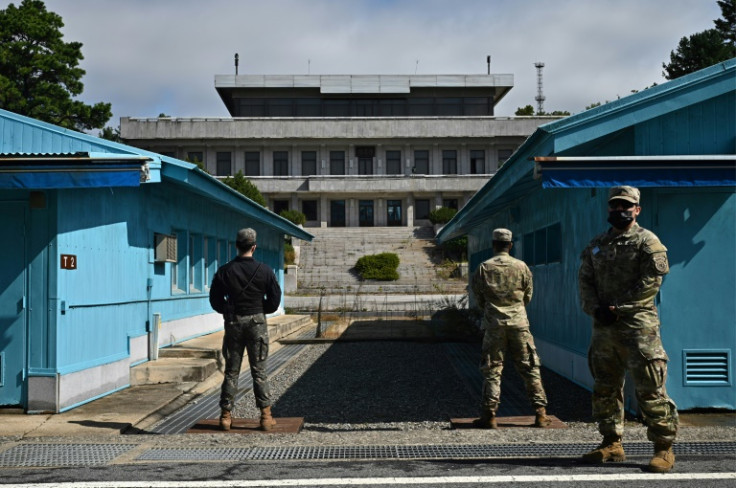Seoul's New Rep On North Korea Vows To Prioritize 'Substantive' Outcomes Over Dialogue

KEY POINTS
- The US, South Korea, and Japan issued a joint statement condemning North Korea's ICBM launch
- On Wednesday, South Korea and Japan reported Pyongyang had fired two additional ballistic missiles
- North Korea on Thursday criticized the nuclear meeting between the U.S. and South Korea
South Korea's newly designated point person on North Korea said Friday that he will prioritize achieving "substantive" outcomes rather than focusing solely on dialogue when dealing with Pyongyang.
Kim Yung-ho, the nominated minister for Seoul's unification ministry, expressed these views during a confirmation hearing at the National Assembly. As a conservative scholar and a prominent critic of human rights violations in North Korea, he was chosen for the position last month.
"Rather than (holding) dialogue for the sake of (holding) it, (I) will take an approach that could lead to substantive outcome," the minister nominee told lawmakers, according to Yonhap News.
His comments come at a time when tensions on the Korean Peninsula continue to escalate as both Koreas exchange strong words regarding North Korea's warning to employ nuclear weapons in response to the recent visit of a United States nuclear-armed ballistic missile submarine (SSBN) to Busan, South Korea.
The South Korean Defense Ministry on Friday issued a strong and serious warning in response to North Korea's threat of using nuclear weapons.
In the statement, Seoul criticized Pyongyang for misrepresenting and unjustly criticizing the purpose of the Nuclear Consultative Group meeting between South Korea and the United States, news agency EFE reported.
They also addressed North Korea's objections to the presence of the U.S. submarine in South Korean waters. The ministry said the meeting and the submarine's deployment were aimed at reinforcing security cooperation and maintaining stability in the region, rather than provoking any military aggression, as mischaracterized by North Korea, Korea Herald reported.
North Korea's defense minister warned the United States, saying the placement of nuclear assets in South Korea might fulfill the conditions that could lead to the use of nuclear arms.
Kang Sun Nam's remarks, as reported by the Korean Central News Agency (KCNA) on Thursday, were made in reaction to the United States' recent deployment of a submarine carrying nuclear-armed ballistic missiles to South Korea. This marked the first time such a deployment had occurred in decades.
"The ever-increasing visibility of the deployment of the strategic nuclear submarine and other strategic assets may fall under the conditions of the use of nuclear weapons specified in the DPRK law," Kang said in a statement, referring to his country by its official name, the Democratic People's Republic of Korea.
In recent weeks, tensions between the United States and North Korea have escalated, primarily due to Pyongyang's defiance of Washington and international sanctions through its increased ballistic missile testing. This situation has added strain to the already delicate relations between the two nations.
Late last week, the United States, South Korea, and Japan issued a joint statement collectively condemning North Korea's launch of an intercontinental ballistic missile just a few days prior. The three nations came together to express their disapproval and concern over North Korea's actions, which further heightened tensions in the region.
"The United States reiterated that its commitments to defend the ROK [Republic of Korea, or South Korea] and Japan are ironclad and backed by the full range of capabilities, including nuclear," the statement said.
On Wednesday, both South Korea and Japan reported that North Korea had fired two additional ballistic missiles, further adding to the escalating situation in the region.
During the same week, the United States and South Korea conducted their inaugural Nuclear Consultative Group meeting, also known as NCG. The White House stated this meeting offered an opportunity for the U.S. to reaffirm its commitment to providing "extended deterrence" to South Korea, demonstrating Washington's support for its ally and its willingness to deter any potential threats in the region.
"Any nuclear attack by North Korea against the United States or its allies is unacceptable and will result in the end of that regime, and the US and ROK sides highlighted that any nuclear attack by the DPRK against the ROK will be met with a swift, overwhelming, and decisive response," the White House said in a statement.
On Thursday, North Korea strongly criticized the nuclear meeting between the United States and South Korea. The state media, represented by the KCNA, expressed their disapproval, saying, "The phase of a military clash on the Korean Peninsula has surfaced as a dangerous reality."
© Copyright IBTimes 2025. All rights reserved.





















